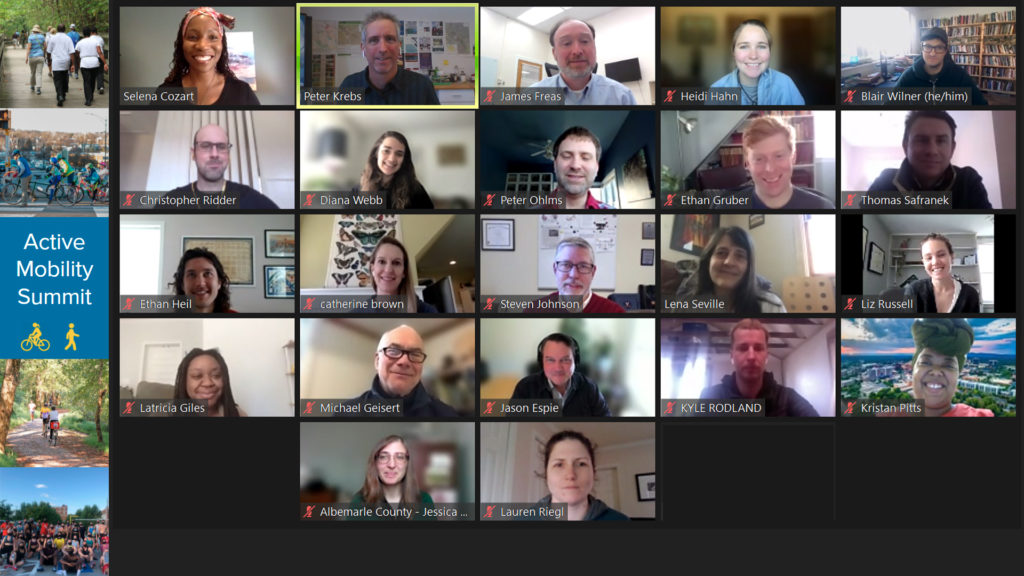Event recap written by Heidi Hahn.

On February 28, representatives from organizations, local businesses, agencies and passionate individuals who share a mission to promote walking, biking, running, everyday access to nature and active lifestyles gathered for a free, half-day workshop to identify areas of collaboration and lay out work plans. About 30 people joined the Zoom-based meeting to check in with one another about collective work started at last year’s first virtual Mobility Active Summit.
Year-in-review
To kick-off the summit, participants shared projects they worked on over the past year, highlighting ideas discussed at last year’s virtual summit that have since borne fruit. Four projects were discussed:
- Mobile Bike Clinic: Community Bikes, CAMBC, & Safe Routes to School have teamed up to create a mobile bike shop and to create a series of pop-up neighborhood bike repair events. They drive a stocked trailer with tools and parts to attend events organized by community partners in different neighborhoods in town. That way, they are able to serve more children and others who need basic bike repairs in settings where they are most comfortable.
- Three Notched Trail: The Three Notched Trail (TNT) is a proposed paved, multi-use trail through Charlottesville, Ivy, and Crozet, over to the Blue Ridge Tunnel in Afton. Since last year, they have created a new web site, hired an intern to explore how railroads and trails can coexist, and successfully lobbied for the hiring of an Albemarle County official to oversee greenway development.
- Rivanna Trail Foundation: The RTF has added significantly more signage to the Rivanna Trail. Proper signage will help people be comfortable on the trail and know where they are. This upgrade is crucial because it most benefits those who are hesitant or unaccustomed to entering the woods.
- Tonsler Trail: The Piedmont Environmental Council connected Greenstone on Fifth to Tonsler Park. The trail is on the ground now and is usable.
Summit distills and refocuses
After sharing impressions from the previous year and providing updates on the progress, summit attendees pitched new ideas (or continuing some from last year) and formed small groups to work on them. Four projects received the most attention:
- Cville Criterium and Bike Fest–A short-course bike race and festival on and around Preston Avenue
- The Three-Notch’d Trail (from Charlottesville to Afton and east to Richmond);
- Transit Outreach through a bus-stop food-drop pilot program
- Small connections between adjoining neighborhoods.
The groups worked through two 40-minute sessions (morning and afternoon) in which they set out work programs for the next six year.It’s a strategic-doing approach that encourages groups to be methodical and action-focused, while acknowledging that people and organizations are busy and can only afford to focus on projects that have real and lasting energy behind them.
Diversity, Equity, Inclusion, and Justice Discussion
This year’s summit included a new feature: an informal and honest, hour-long conversation about how principles of diversity, equity, inclusion, and justice (DEIJ) apply to attendees’ collective work. The panel was led by Dr. Selena Cozart (Moderator), Latricia Giles (Community Climate Collaborative), and Tiffany Parker (PEC) with free and frank discussion from the group. Selena proposed four questions during this session:
- What do we mean by inclusivity? Why does it matter?
- Is inclusivity about audience / customers / recipients or about actors / participants / decision-makers? Or both?
- Does it require fundamentally rethinking of missions or changing of tactics?
- What are practical steps organizations can take to be more attractive to groups of people who have not traditionally been a part of their work?
The panelists emphasized being welcoming to all–and allowing people to be their full authentic selves, even (or especially) when they are complicated. Latricia framed it this way: “Whatever people naturally bring to space is important… It’s one thing to say we want the organization to be inclusive, but how are we being true to the process and on the side of many people who have not had voices heard at the table.”
Selena used the analogy of being at someone else’s family reunion where there are inside jokes. So it’s essential to truly pull people in and give new people all the tools and resources, and also truly hearing them even if they speak in a way that may be new or unfamiliar.
The panel spoke about DEIJ and creating plans for workplaces,as many in the summit work for organizations. Tiffany suggested, “Get back to basics. Ask, ‘What is your purpose? What is your mission? What’s the outcome of your mission?’ Take a step back and get external feedback. Then once you figure out where the North star is, the tactics come out of that. What does 50 years from now look like? You have to be open to the whole thought process.”
Summit members agreed that DEIJ work is about shared humanity, kindred people, and solidarity. The group concluded that DEIJ work is a journey and it is everyone’s responsibility to become educated in order to be involved in DEIJ conversations.
Staying accountable by keeping touch
The afternoon work session took place after the panel discussion, so the teams went back to work with a renewed focus on inclusivity. They set goals that can be accomplished in 90 days, six months and a year. The Piedmont Mobility Alliance will convene a mini-summit in late summer, with an opportunity to reconnect.
You can read the work groups’ detailed notes–and a list of resources from the DEIJ discussion–in the Summit Resource document.
Are you interested in creating a better connected community, with everyday access to the outdoors? Learn more about the Piedmont Mobility Alliance and consider joining or adding your organization.
